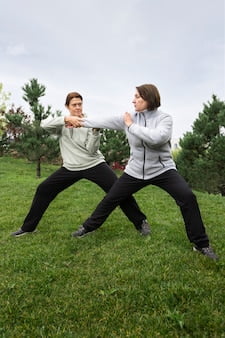The Benefits of Tai Chi for Your Brain
Tai Chi, also known as Tai Chi Chuan, is a form of martial art that is often practiced for its health benefits. It originated in China more than 500 years ago and has gained popularity in recent years. Tai Chi is known for its gentle movements and focus on breathing and meditation. While it has numerous benefits for the body, it is also believed to be beneficial for the brain.
Improves Balance and Coordination
Tai Chi is an exercise that requires coordination and balance. It involves slow and gentle movements that require a lot of focus and concentration. As a result, practicing Tai Chi can help improve your balance and coordination. This is particularly beneficial for the elderly or those with conditions that affect their balance, such as Parkinson’s disease.
Reduces Stress and Anxiety
Stress and anxiety are common problems that can have a negative impact on the brain’s function. Tai Chi is a form of meditation that involves deep breathing and relaxation techniques. These techniques can help reduce stress and anxiety, which can improve brain function. A study published in the Journal of Alternative and Complementary Medicine found that practicing Tai Chi for 12 weeks resulted in significant improvements in stress, anxiety, and depression.
Improves Cognitive Function
Tai Chi requires a lot of focus and concentration, which can stimulate the brain and improve cognitive function. It has been shown to improve memory and learning in older adults, as well as improve attention and concentration in people of all ages. A study published in the Journal of Alzheimer’s Disease found that practicing Tai Chi for 20 weeks improved cognitive function in individuals with mild to moderate dementia.
Reduces the Risk of Dementia
Dementia is a common age-related condition that can have a significant impact on the brain’s function. Tai Chi has been shown to reduce the risk of dementia in older adults. A study published in the Journal of Alzheimer’s Disease found that practicing Tai Chi for 20 weeks improved cognitive function and reduced the risk of dementia in individuals with mild to moderate dementia.
Boosts Brain Plasticity
Brain plasticity refers to the brain’s ability to change and adapt in response to new experiences. Tai Chi is a complex activity that requires the brain to focus and adapt to new movements. This can stimulate the brain’s plasticity and help it to adapt and change more easily. A study published in the Journal of Neuroimaging found that practicing Tai Chi for 12 weeks improved brain plasticity in older adults.
Promotes Mind-Body Connection
Tai Chi is a form of meditation that focuses on the mind-body connection. It involves deep breathing, visualization, and relaxation techniques that help to connect the body and mind. This can have a positive impact on brain function, as it can help to reduce stress, improve mood, and boost cognitive function.
Conclusion
Tai Chi has numerous benefits for the brain, including improved balance and coordination, reduced stress and anxiety, improved cognitive function, reduced risk of dementia, boosted brain plasticity, and improved mind-body connection. It is a low-impact exercise that can be practiced by people of all ages and fitness levels. If you’re looking for a gentle and effective way to improve your brain function, consider giving Tai Chi a try.
| Benefits of Tai Chi for the Brain | |
|---|---|
| Improved Balance and Coordination | |
| Reduced Stress and Anxiety | |
| Improved Cognitive Function | |
| Reduced Risk of Dementia | |
| Boosted Brain Plasticity | |
| Promotes Mind-Body Connection |





